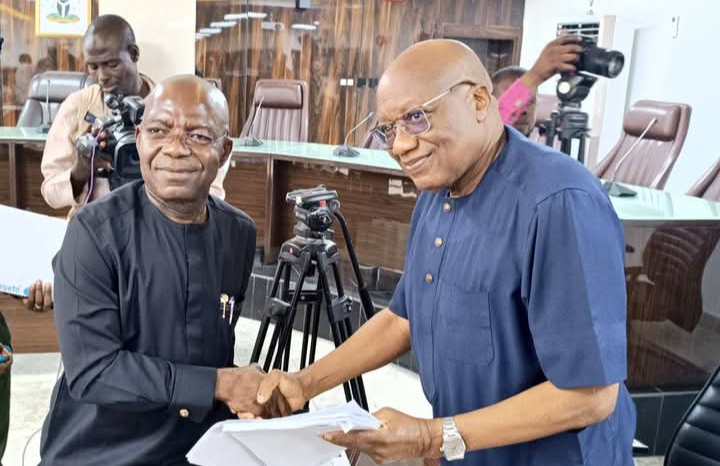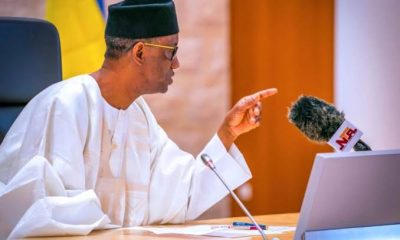News
SAD Report; World Bank warns over unrest in Nig, Kenya, others, says 464m sub-Saharan Africans live in abject poverty

The World Bank has revised its economic growth forecast for the Sub-Saharan Africa (SSA) downward to 3% for this year, a drop from the initial 3.4% projection made in April.
This change is largely attributed to the devastating impact of Sudan’s escalating civil war on its economy.
The region’s growth has been slowing down, with the three largest economies – Nigeria, South Africa, and Angola – experiencing a significant slowdown, averaging only 1.8% growth last year.
This downturn is a concern, especially considering the region’s history. For instance, in 2020, Sub-Saharan Africa’s output contracted by 2.4% due to the COVID-19 pandemic, marking the first economic contraction in a generation and the deepest recession since the 1960s.
The World Bank’s latest report, Africa Pulse published on Monday, highlights these challenges and provides valuable insights into the region’s economic prospects.
It’s essential for policymakers and stakeholders to address these issues to foster sustainable growth and development in Sub-Saharan Africa.
“The downgrade is partly explained by the collapse of economic activity in Sudan caused by the armed conflict, which has destroyed physical and human capital as well as state capacity, with adverse impacts on food security and greater forced displacement,” the World Bank stated.
According to the report, Sudan’s economy is projected to decline by 15.1% in 2024 before recovering slightly the next year with 1.3% growth. The northeast African country has been embroiled in a violent conflict since April 2023, with UN estimates putting the death toll in the thousands. Around 11 million people have been displaced.
Ahead of the report’s release, the World Bank’s chief economist for Africa told reporters on Friday that without the Sudanese conflict, regional growth in 2024 would have been 3.5% higher and in line with the initial April estimate.
“So that’s how much this is knocking off the regional growth rate,” Andrew Dabalen said, adding that “Sudan, the economy, has basically completely disappeared.”
Regardless, the Washington-based lender expects economic growth in 1.24 billion-strong SSA to accelerate to 4% in 2025 and 2026. This will be driven by an expected boost in private consumption and investment, owing to lower interest rates as the region’s inflation rate falls to 4.8% this year from 7.1% in 2023.
The institution also expressed concern about the region’s per capita growth, claiming that it has not been sufficient to reduce extreme poverty. It stated that SSA’s real income per capital in 2024 is about 2% lower than it was in 2019 before the COVID-19 pandemic.
“The number of poor people increased from 448 million in 2022 to 464 million in 2024,” it stated.
“The high cost of living, corruption, and, more broadly, weak governance have triggered protests and palpable anger among the youth in Kenya, Nigeria, and Uganda – unrest that could spread throughout the region,” the World Bank warned.
News
SAD! APC lawmaker dies while asleep

The lawmaker representing Kaura Namoda South Constituency in the Zamfara State House of Assembly, Aminu Ibrahim Kasuwar-Daji, has died.
It was gathered that the lawmaker passed on in his sleep during the early hours of Wednesday.
Aminu Ibrahim Kasuwar-Daji’s sudden death came as a shock to many in the state, especially his colleagues and political associates.
The All Progressives Congress (APC) in Zamfara, the party under which he was elected, expressed deep sorrow over his passage.
Members of the party, including the State Working Committee and other supporters, described his death as a great loss.
They said he was known for his dedication and honesty in serving his people.
His family, community members in Kaura Namoda South, and fellow lawmakers have been thrown into mourning as preparations for his burial began.
According to Islamic rites, he was buried today at 3:00 pm in his hometown of Kasuwar-Daji, located in the Kaura Namoda Local Government Area.
Many in the state have continued to express grief as they remember the role he played in representing the people and contributing to the work of the state assembly.
News
Just in: Sam Olumekun takes over as INEC’s Acting Chairman

Mr. Sam Olumekun has taken over at the Independent National Electoral Commission (INEC) as Acting Chairman.
Olumekun is INEC’s National Commissioner in charge of Information and Voter Education.
He performed his first duties today, receiving a high-level delegation of the Labour Party (LP) at the Commission’s headquarters in Abuja with other National Commissioners in attendance.
The delegation was led by Abia State Governor Dr. Alex Otti, who visited the Commission to discuss key developments within the Labour Party.
It was gathered that both parties engaged in discussions centered on enhancing collaboration and reinforcing democratic values.
During the visit, Governor Otti formally presented a Certified True Copy of the recent Supreme Court judgment concerning the party’s leadership.
He noted that the meeting was aimed at fostering clarity, mutual understanding, and institutional alignment regarding the Labour Party’s current structure.
Mr. Olumekun, the Acting INEC Chairman, reaffirmed the Commission’s unwavering commitment to neutrality, transparency, and the rule of law in the discharge of its constitutional responsibilities.
Recall that a viral WhatsApp message had indicated that Prof. Mahmood was sacked by President Bola Tinubu and replaced with one Prof. Bashiru Olamilekan.
“INEC Chairman Prof. Mahmud Yakubu has been replaced with Prof. Bashiru Olamilekan by President Tinubu,” the message, which had no attribution, read. However, both INEC and the Presidency debunked the widespread report.
Yakubu, who is rounding off his second tenure in office, is expected to exit the system towards the end of this year.
The process of appointing an INEC chairman is the President nominating a candidate and forwarding his particulars to the Department of State Services (DSS) for profiling.
After such screening, the President, thereafter, takes the name to the National Council of State for its advisory review.
Based on the outcome, the President sends the name to the Senate for screening and confirmation.
News
Crude oil prices slide further, now selling below $57

Crude oil prices have dropped below $57, following a previous rate of $59.78.
This decline coincides with the imposition of tariffs on several countries by US President Donald Trump.
A report from West Texas Intermediate attributes this price slump to consistent 6% reductions observed last week.
JPMorgan Chase & Co has warned that these tariffs could likely push both the US and global economies into a recession this year.
The financial institution explained that the tariffs, set to take effect this week, are expected to have widespread economic repercussions.
Market analysts and the business community have expressed concerns about the negative implications of these measures, predicting a slowdown in economic activities and a subsequent decline in oil demand.
-

 News13 hours ago
News13 hours agoBanditry:” I was chained for 32days while in their den, killed my wife as I watch-Nat’l Assembly DD narrates experience
-

 News8 hours ago
News8 hours agoPolice Inspector Slumps, Dies While Celebrating After Arsenal Wallop Real Madrid 3-0
-

 News14 hours ago
News14 hours agoUS revokes more than 500 foreign student visas
-

 News20 hours ago
News20 hours agoBandits have seized control of 64 communities in Plateau – Gov Muftwang
-

 News15 hours ago
News15 hours agoIbas picks administrators for 23 Rivers LGs(SEE list)
-

 Economy20 hours ago
Economy20 hours agoMobile Money transactions hit $1.68trn in one year
-

 News21 hours ago
News21 hours agoRibadu warns against ransom payment to terrorists, kidnappers, others
-

 News7 hours ago
News7 hours agoSAD! APC lawmaker dies while asleep





